As a caregiver, there are healthy ways to work through and resolve family conflict.
Taking care of a loved one while managing the family dynamics can be difficult. In addition to keeping track of the many responsibilities of caring for your loved one, you have to manage the emotions of your loved one, yourself, and the other members of your family.
The family doesn’t have to be torn apart with conflict during this challenging time. There are tools to help you address and resolve disagreements that arise between both your family members and the loved one who depends on your care.
Address and Resolve Family Disagreements
It can feel overwhelming to manage each person’s unique emotions and point of view within a family conflict surrounding the care of a loved one. This is made more difficult by disagreements from the past.
As complex as these various conflicts may seem, many can be corrected by establishing basic communications and expectations.
If you aren’t accustomed to having family meetings, this is an important time to try it. Set aside dedicated time for you and your family members involved in the care of your loved one. Establish some ground rules that will help you manage care on an ongoing basis and open up the lines of communication for each person involved. This could include the following:
- Decide who does what: Be clear about who will take what responsibilities. Listen to each other to make sure each person is capable of what they take on and that they feel supported in it.
- Decide how to communicate updates: To sustain the expectations you set in your first discussion, come up with a simple plan for who needs to know what information and when. Discuss who is most available in case of an emergency and how emergency updates are communicated to everyone. With ongoing care, have a text group or even a notebook where you can communicate details from one person to another, such as your loved one’s activities, condition, or meals, for example.
- Be clear about what you need: Ask for help or initiate the discussion when you need to re-evaluate your role in your loved one’s care. Keeping the lines of communication open is important to sustaining ongoing caregiving and peace within the family.
- Seek outside support: Discuss your options and who can research outside support to help your family manage responsibilities that might be handled better by an outside professional, for example.
Manage Conflict with the Loved One You Care For
The last person you want upset is the loved one who depends on your care. As a loved one ages and becomes more dependent on their family members, it’s natural for personalities to clash and for you to sometimes feel frustrated or overwhelmed.
Shifting your perspective can help you understand healthy ways to manage conflict on this level.
Teepa Snow’s Positive Approach to Care is a resource to help caregivers focus on their relationship with care recipients who have dementia. Her approach can help those caring for ageing loved ones regardless of whether they need memory care. It’s built on understanding your care recipient’s condition to inform how you respond to them and can improve quality of life, both for your loved one and for yourself.
Watch Teepa Snow’s video for an example of how to reduce conflict.
At The Kensington Sierra Madre, our certified Positive Approach to Care trainer follows this methodology closely and helps others learn the techniques and this approach to memory care.
She provides other various tips to reduce conflict with the person you care for, such as:
- Check your stress levels: Keep your stress levels low when communicating with a loved one you care for. They will notice your mood and it can affect how they feel and interact with you. Take a minute for yourself to destress – check in with yourself, take a few deep breaths and become aware of how your stress levels might lead to agitation between you and your loved one.
- Don’t take it personally: If your loved one reacts harshly toward you, be empathetic to their situation and understand that their frustration likely stems from many factors outside of your control. They’re likely losing their independence and may be in pain or not feeling well. This makes it difficult for them to be aware of their reactions to you.
- Show your support: Avoid thinking of yourself as an authority over your loved one and instead focus on providing them with support. Show that you’re on their side. This can change the tone from telling someone what to do, to allowing them to feel more confident in doing something because they feel like you have their back.
Support for Caregivers and their Families
Beyond working within your family to reduce conflict and support your efforts to care for your loved one, there are outside services and resources that can help.
Kensington Konnect is our hub for informative and entertaining resources for caregivers, seniors, and families, including how-to videos, published articles featuring The Kensington, online classes, virtual tours, concerts, and more.
The Kensington Blog features tips for caregivers and seniors, including this recent post, Top Picks for Caregiver Books.
The Kensington Sierra Madre can also serve as a partner if you’re interested in the transition for your loved one to assisted living or memory care.
Give us a call today to learn more.
Further Reading:
To learn more about our exceptional assisted living and memory care at The Kensington Sierra Madre, click below or give us a call today for any questions. We promise to love and care for your family, as we do our own.
Additional Recommended Reading:
Caregiver Burnout vs. Compassion Fatigue
Home Automation to Simplify Senior Living
Tips for Caregivers: Appetite Change



